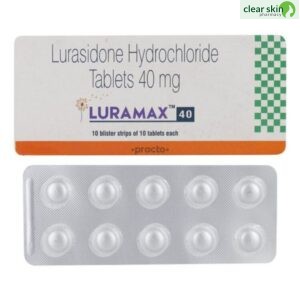Qutipin SR 50 MG
Qutipin 50 is a pharmaceutical agent used to treat a variety of conditions.
Qutipin 50 is a medication belonging to the class of drugs known as ‘antipsychotics.’ It is used to treat, among other conditions, bipolar depression, psychosis, and schizophrenia. Manic or enthusiastic phases are followed by depressive phases in bipolar disorder. Hallucinations (seeing or hearing things that are not real) and delusions (believing things that are not true) are symptoms of schizophrenia (wrong beliefs).
The antipsychotic medication quetiapine is contained within Qutipin 50. It functions by inhibiting dopamine, a neurotransmitter located in the brain that, among other conditions, is responsible for the onset of symptoms in schizophrenia and bipolar disorder. Qutipin 50 has also been shown to affect other neurotransmitters in the brain, such as serotonin; it is conceivable that this contributes to its therapeutic benefits. When consumed as a whole, Qutipin 50 helps restore the balance of dopamine and serotonin in the brain, thereby enhancing cognition, mood, and behavior.
It is available in both oral tablet and injectable solution formulations. Common adverse effects of Qutipin 50 include dizziness, drowsiness, headache, dry mouth, abnormal muscle movements such as difficulty moving muscles, tremors, and muscle stiffness, a change in cholesterol levels, weight gain, and a decrease in hemoglobin (a blood protein that transports oxygen) levels. In addition, children and adolescents exhibit enlargement of the breasts in both boys and girls, increased production of breast milk (due to an increase in prolactin hormone, which aids in the production of breast milk), and irregular menstrual cycles. Please do not cease taking Qutipin 50 without first consulting your doctor, as withdrawal symptoms may occur.
You should not take Qutipin 50 if you have an allergy to quetiapine or any of the other components. Notify your doctor if you have any liver, kidney, or heart-related health concerns prior to taking Qutipin 50. Notify your physician if you are also experiencing sleep disturbances. It is not recommended for use in minors younger than 18 years old (18 years). Contact your doctor immediately if you experience suicidal ideation or if your depression worsens as a result of taking Qutipin 50. Due to its lactose content, Qutipin 50 should not be administered to individuals who are lactose intolerant or allergic to certain sugars. Inform your doctor if you are breastfeeding or expecting a child.
Qutipin 50 has numerous applications.
Bipolar depression, psychosis, and schizophrenia are all possible conditions.

Positive aspects of medicine
The active ingredient in Qutipin 50 is quetiapine, which pertains to the antipsychotic drug class. It functions by inhibiting the activation of dopamine receptors, thereby preventing excessive dopamine release. Dopamine is known as the “feel-good hormone” because it stimulates feelings of joy, excitement, and delight. It has an effect on cerebral function, enhancing, among other things, mood, cognitive ability, and social behavior. It has been demonstrated that it slows the progression of symptoms in patients with schizophrenia, bipolar disorder, and other mood disorders. Qutipin 50 has also been shown to affect other neurotransmitters in the brain, such as serotonin; it is conceivable that this contributes to its therapeutic benefits. When consumed as a whole, Qutipin 50 helps restore the balance of dopamine and serotonin in the brain, thereby enhancing cognition, mood, and behavior.
Description of How to Utilize
It is available in both oral tablet and injectable solution formulations. The dosage and duration of this medication is determined by the physician. Take the pills with a full glass of water, and consume them whole. It should not be fractured, crushed, or chewed. Your medication can be taken with or without sustenance, depending on your preference. When prescribed once daily, it is commonly taken before bedtime; when prescribed twice daily, it is commonly taken in the morning and before nightfall. It is essential to take your medication at the same time every day. Even if your symptoms improve, you must consult your doctor before discontinuing the prescribed medication. Injections are only administered by a medical professional using a hypodermic; therefore, you should not attempt to administer injections yourself.
Storage
Place in a cold, dry area out of direct sunlight.
Qutipin 50 Side Effects
Qutipin 50 can cause adverse effects such as dizziness, drowsiness, headache, dry mouth, abnormal muscle movements including difficulty moving muscles, tremors, and muscle stiffness, altered cholesterol levels, weight gain, and decreased hemoglobin levels when taken in high doses (a protein in the blood that transports oxygen). Common side effects in children and adolescents include breast enlargement in both boys and girls, increased breast milk production (due to an increase in the prolactin hormone, which aids in the production of breast milk), irregular menstruation, increased appetite, vomiting, elevated blood pressure, and abnormal muscle movements. Do not stop taking Qutipin 50 without first consulting your physician. It is possible to experience withdrawal symptoms such as insomnia (sleeplessness), nausea, headache, diarrhea, illness (vomiting), vertigo, irritability, and the development of suicidal thoughts if you abruptly discontinue use of Qutipin 50. Your doctor may advise you to cease taking the medication by gradually decreasing the dosage.
Substance Warnings and Advisories
If you have an allergy to quetiapine or any of the other ingredients in this medication, you should not take it. Before taking Quetiapine, please consult your physician if you have any of the following conditions: low blood pressure; stroke; liver problems; seizures; diabetes; dementia (memory loss); substance abuse; sleep apnea; sleep disorder; or urinary retention. Because quetiapine contains lactose, it should not be administered to lactose-intolerant individuals. It is crucial not to abruptly cease taking the drug, as doing so may result in withdrawal symptoms, especially in young people who may have suicidal thoughts.
Drug Interactions occur frequently.
Drug interactions: Quetiapine may interact with a variety of other medications, including antidepressants (citalopram, escitalopram, bupropion), opioid pain relievers (codeine, hydrocodone), sleep or anxiety medications (alprazolam, lorazepam, zolpidem), muscle relaxants (carisoprodol, cyclobenzaprine), and antihistamines (cetirizine, diphenhydramine (acetaminophen, hydrocodone, tramadol).
Drug-food interactions: Quetiapine may interact with grapefruit and alcohol, thereby increasing the likelihood of experiencing adverse effects.
Patients with cardiac issues such as QT prolongation (problems with the heart’s rhythm), acute alcoholism, depression of the central nervous system (CNS), dementia, stroke, seizures, diabetes, and liver issues should be treated with caution if they are taking quetiapine.
Precautionary Recommendations
ALCOHOL
Consuming alcohol while taking Quetiapine may exacerbate the disease and increase the likelihood of side effects.
PREGNANCY
Quetiapine is categorized as a category C drug. Pregnant women should not consume it without a doctor’s prescription.
BREAST FEEDING
Quetiapine should not be administered to lactating mothers unless prescribed by a physician.
DRIVING
When utilizing quetiapine, drowsiness may occur while driving. While taking Quetiapine, it is not recommended that you drive or operate heavy apparatus.
LIVER
Patients with liver disease should take Quetiapine with caution, according to the FDA. Some dosage adjustments may be necessary.
KIDNEY
Patients with kidney disease must exercise caution when taking quetiapine. Some dosage adjustments may be necessary.
The formation of habits is impossible.
Diet and Lifestyle Suggestions
Avoid eating or drinking grapefruit or grapefruit juice while taking Quetiapine, as it may reduce the efficacy of the medication.
Extreme heat makes it more difficult for the body to calm down, so it is best to avoid strenuous exercise. Stay hydrated and avoid venturing outside when the temperature is high.
Alcohol should not be used because it induces drowsiness and also exacerbate the medical condition.
Maintain a nutritious diet and regularly monitor your weight.
Special Offer
Even if you do not have diabetes, quetiapine may cause your blood sugar levels to rise, and this is particularly true for patients with schizophrenia. Contact your doctor immediately if you experience any of the following symptoms: increased thirst, frequent urination, exhaustion, or an increase in appetite.
The results of a urine drug screen (an analysis to determine the presence of illegal substances or commonly abused medications in the blood, such as methadone or tricyclic antidepressants) may be positive depending on the testing method used. In such cases, a more specialized examination may be required.
Due to the nature of this product, it cannot be returned.
Patients’ Preoccupation
Schizophrenia (psychosis) and other psychiatric disorders are characterized by a disruption in the processing of cerebral information. Symptoms include hallucinations (seeing or hearing things that are not real) and delusions (false beliefs), as well as an overall sense of isolation from the rest of society. They lose the ability to distinguish between reality and false beliefs in this state.
Bipolar disorder and manic depression are characterized by mood swings ranging from manic episodes of extreme enthusiasm to severe depression. Bipolar disorder can be caused by multiple factors, including genetics, substance abuse, and psychological trauma.
FAQs
The active constituent in Qutipin 50 is quetiapine, which inhibits dopamine receptors in the brain. As a result of the inhibition of dopamine production in their bodies, patients suffering from schizophrenia and bipolar depression will experience a decrease in the occurrence of symptoms. In addition, quetiapine has an effect on other neurotransmitters in the brain, such as serotonin, and it is conceivable that these actions also contribute to its therapeutic efficacy. Quetiapine, when administered in its entirety, restores the balance of dopamine and serotonin in the brain, resulting in enhanced cognition, mood, and behavior.
Quetiapine is a blood pressure-raising medication. As a result, it is advised that you regularly monitor your blood pressure while taking Quetiapine.
Quetiapine may induce vertigo and heighten the risk of stumbling. Therefore, when rising from a seated or lying position, do so gradually.
Due to the drowsiness induced by Quetiapine, it is not advised to drive or operate heavy machinery after taking the drug.
Ongoing treatment with Quetiapine may cause adverse effects such as tardive dyskinesia (uncontrolled movements of the arms and legs), high blood sugar, vision impairment, and weight gain. In contrast, your doctor may prescribe Quetiapine for a prolonged duration if the benefits outweigh the risks.
The use of quetiapine in children and adolescents younger than 18 years old is not recommended for their safety. The drug may cause undesirable adverse effects in children, including breast enlargement in both boys and girls, irregular periods, and weight gain.








Be the first to review “QUTIPIN SR 50 MG 10 Tablets”